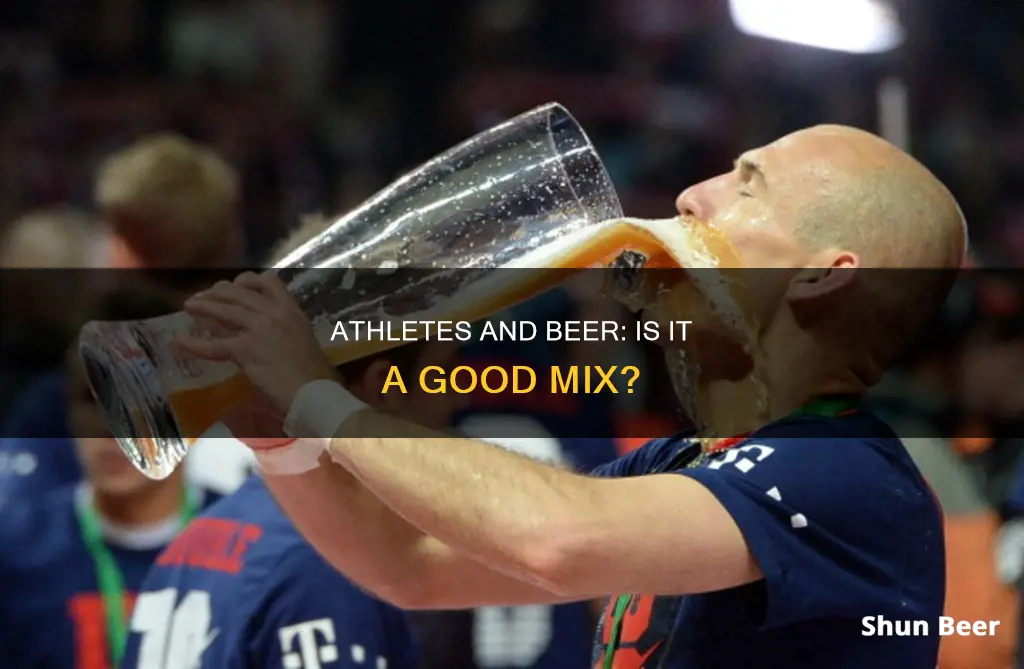
Drinking beer is a time-honoured tradition for many athletes and sports enthusiasts. But is it a good idea? Alcohol can negatively impact athletic performance, impairing muscle growth, slowing reaction time, disrupting sleep, and causing dehydration. However, non-alcoholic beer is on the rise, with some studies suggesting it may have benefits for athletes, including enhanced performance, energy, and recovery. So, do athletes drink beer? The answer is it depends—while some athletes may enjoy a beer or two, others may opt for non-alcoholic alternatives or avoid alcohol altogether to maintain optimal performance.
| Characteristics | Values |
|---|---|
| Alcohol type | Beer, wine, spirits |
| Alcohol quantity | 5 or more drinks in a night can impact athletic performance for 72 hours |
| Alcohol timing | Drinking before exercise affects heat tolerance and dehydration |
| Alcohol and nutrition | Alcohol calories are converted into fat and inhibit nutrient absorption |
| Alcohol and recovery | Alcohol can slow muscle recovery and repair |
| Alcohol and soreness | Alcohol can reduce muscle soreness |
| Alcohol and inflammation | Alcohol can increase inflammation |
| Alcohol and sleep | Alcohol disrupts sleep cycles |
| Alcohol and rehydration | Beer can rehydrate athletes |
| Alcohol and kidney stones | Beer can prevent kidney stones |
| Alcohol and bone strength | Beer can help build strong bones |
| Alcohol and team bonding | Alcohol can help with team bonding |
| Alcohol and heart health | Alcohol can raise HDL cholesterol levels and reduce blood-clot formation |
| Alcohol and gut health | Alcohol can be good for gut health |
What You'll Learn

Non-alcoholic beer may improve athletic performance
While drinking beer is a popular way for athletes to unwind, non-alcoholic beer may be the better choice to improve athletic performance. Non-alcoholic beer has been marketed as a recovery drink for athletes, especially in Germany, where it is extremely popular among athletes.
Non-alcoholic beer is said to be rich in antioxidants and polyphenols, which help combat inflammation, as well as vitamins, minerals, and amino acids. It also contains a plant-based nootropic compound called hordenine that can help increase focus and energy. A 2012 study found that male runners who drank non-alcoholic beer three weeks before and two weeks after competing in a marathon experienced reduced inflammation and a lower incidence of respiratory tract illness, which can increase after strenuous exercise.
Non-alcoholic beer has also been shown to maintain electrolyte homeostasis during exercise. A study comparing the effects of consuming beer, non-alcoholic beer, and water before exercise found that non-alcoholic beer helped maintain plasma Na+ and K+ levels, which are important for athletic performance and health.
However, it is important to note that the current research is limited, and there is a need for more studies to determine the effectiveness of non-alcoholic beer as a recovery drink compared to traditional post-exercise sports drinks. Nonetheless, if you're looking for a drink to improve your athletic performance, non-alcoholic beer may be worth considering.
Beer and Crohn's Disease: What You Need to Know
You may want to see also

Alcohol can slow muscle recovery
After a workout, the body enters a state of recovery, which can last up to 24 hours. During this time, what you eat and how much rest you get can determine your rate of protein synthesis. Alcohol ingested during this window can negatively impact muscle growth and the body's anabolic response.
A 2014 study found that individuals who were given alcohol and a carbohydrate-rich meal or alcohol and a protein-rich meal four hours after an intense workout experienced considerable decreases in myofibrillar protein synthesis compared to those who only had a protein meal.
Even if you wait until after your body has recovered from a workout, alcohol may still reduce your body's ability to strengthen its muscles. Consuming alcohol has the potential to negate up to 14 days' worth of training in some athletes. Alcohol can decrease testosterone levels, which can lead to decreased lean muscle mass and muscle recovery, impairing performance.
It is important to note that non-alcoholic beer may be an exception to these findings. It has been found to provide a high load of antioxidants and polyphenols, which help combat inflammation, as well as vitamins, minerals, and amino acids.
Kayaking and Beer: A Fun, Safe Lake Erie Adventure
You may want to see also

Beer can be a source of hydration
A study published in the Journal of the International Society of Sports Nutrition in 2015 compared the hydration levels of athletes who consumed mineral water alone or a combination of beer and mineral water after a workout. The results showed no significant differences in hydration levels between the two groups, indicating that beer may not necessarily lead to dehydration when consumed in moderation. Additionally, another study from the same year suggested that light beer with added sodium can aid in fluid retention post-workout.
Non-alcoholic beer, in particular, has gained attention as a potential sports drink due to its nutritional content. It provides antioxidants, polyphenols, vitamins, minerals, amino acids, and a plant-based nootropic compound called hordenine, which can enhance focus and energy. A 2012 study on male runners who consumed non-alcoholic beer before and after a marathon found reduced inflammation and a lower incidence of respiratory tract illness, which are common issues after strenuous exercise.
The production process of non-alcoholic beer is also important to consider. Traditional methods of removing alcohol can result in the loss of proteins, minerals, antioxidants, and soluble fiber. However, using malt extract as the base of the beverage can better preserve these nutrients, making it a more efficient way to create a non-alcoholic malt-based drink with potential health benefits.
While beer can contribute to hydration, it is essential to remember that excessive consumption can lead to dehydration and negatively impact athletic performance. As with any beverage, moderation is key to maintaining a healthy balance and ensuring that beer supports hydration without causing adverse effects.
Beer and Boils: Is There a Connection?
You may want to see also

Alcohol can reduce muscle soreness
Alcohol can have a positive impact on muscle soreness, but only when consumed in moderation. A 2014 study in the International Journal of Kinesiology and Sport Science found that athletes reported feeling less sore when they drank beer versus a placebo after a hard session. However, it's important to note that excessive alcohol consumption can lead to impaired muscle growth, dehydration, and negatively impact sleep patterns, all of which hinder muscle recovery.
When consumed in moderate amounts, alcohol can have an anti-inflammatory effect, which may be beneficial for reducing muscle soreness. However, heavy drinking has the opposite effect, increasing inflammation and making conditions like arthritis and gout more severe. Additionally, alcohol can worsen existing joint pain and lead to body aches and cramps due to its diuretic properties, causing dehydration.
The key to reducing muscle soreness with alcohol lies in moderation. Excessive drinking can negatively impact muscle health and recovery, while moderate consumption may provide some anti-inflammatory benefits. It's also worth noting that non-alcoholic beer has been found to provide similar anti-inflammatory effects, without the risks associated with alcohol consumption.
While alcohol may provide some relief from muscle soreness, it's important to consider the potential negative consequences on overall athletic performance. Alcohol can affect sleep patterns, increase reaction time, and decrease hand-eye coordination, all of which can impact an athlete's performance. Therefore, athletes should carefully weigh the potential benefits against the risks and always prioritize proper hydration and nourishment.
Rotten Beer: Is It Safe to Drink?
You may want to see also

Alcohol can disrupt sleep
Alcohol can negatively impact sleep quality, even in moderate amounts. It can disrupt the sleep cycle by altering the sequence and duration of the four stages of sleep. Typically, a sleep cycle begins with three non-rapid eye movement (NREM) stages, followed by the rapid eye movement (REM) stage. However, consuming alcohol before bed can result in more N3 sleep or "deep sleep" and less REM sleep initially. Later in the night, once the body has metabolized the alcohol, there is a rise in N1 sleep, the lightest stage of sleep, leading to frequent wakings and fragmented sleep.
Alcohol's disruptive effects on sleep can be both immediate and long-term. Acute administration of large amounts of alcohol before sleep can lead to decreased sleep onset latency and changes in sleep architecture early in the night. This can result in disrupted and poor-quality sleep later in the night. Long-term alcohol use can result in chronic sleep problems, such as insomnia, and sleep disorders like sleep apnea. Individuals with alcohol dependence often experience insomnia symptoms, and treating insomnia may aid in recovery and reduce the likelihood of relapse.
Additionally, alcohol can interfere with circadian rhythms, disrupting the body's sensitivity to cues like daylight and darkness, which are crucial for the sleep-wake cycle. It can also affect individuals who snore or have sleep apnea, as alcohol causes tongue and throat muscles to relax and increases airway resistance, leading to more frequent and prolonged breathing events during sleep.
The negative impact of alcohol on sleep is further exacerbated when combined with caffeine consumption during the day to counteract sleepiness. This can create a vicious cycle, where caffeine makes it challenging to fall asleep at bedtime, leading to more alcohol consumption to induce sleep, resulting in disrupted sleep and increased sleepiness the next day.
Beer and Constipation: A Risky Relief?
You may want to see also
Frequently asked questions
Yes, athletes do drink beer. Research shows that athletes are more likely to drink beer, and the harder they work out, the more they drink.
Drinking beer in moderation will not add to an athlete's hydration woes. Beer can also help reduce muscle soreness, prevent kidney stones, and build strong bones. However, drinking beer in excess will affect athletic performance.
Drinking beer in excess will slow down muscle repair, protein synthesis, and adaptation processes. It will also disrupt sleep cycles, leading to less restorative sleep. Additionally, alcohol is a diuretic, which can cause dehydration and electrolyte imbalances.







